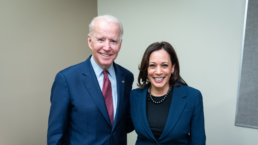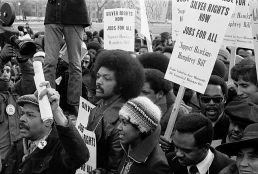This argument is particularly unconvincing this time around. And it doesn’t offer a realistic prescription for future success.
By Kate Aronoff, The New Republic
The Democratic Party is looking for a scapegoat for its disastrous 2024 election performance. As ever, no shortage of pundits and party operatives are punching left. Democratic Congressman Ritchie Torres accused his colleagues of “pandering” to the “far left.” Massachusetts Congressman Seth Moulton scolded the party for, apparently, being too considerate of trans kids, whom Republicans targeted with at least $17 million worth of ads. “I have two little girls,” he told The New York Times for a November 7 story on how the party was relating to its losses. “I don’t want them getting run over on a playing field by a male or formerly male athlete. But as a Democrat, I’m supposed to be afraid to say that.”
Adam Jentleson, a former staffer for Harry Reid and John Fetterman, recently expanded this line of argument into an op-ed for the Times, earning plaudits from former Obama speechwriter and Pod Save America host Jon Favreau. He argues that Democrats are “crippled by a fetish for putting coalition management over a real desire for power,” and too eager to please “liberal and progressive interest groups” that “impose the rigid mores and vocabulary of college-educated elites, placing a hard ceiling on Democrats’ appeal.” As examples, he cited positions on trans rights and immigration that Harris adopted during her presidential primary campaign in 2019, that had been advocated for by the likes of the ACLU and the Sunrise Movement, and that Republicans ran attack ads about this cycle.

Jentleson’s prescription for Democratic victory boils down to resisting the influence of groups like Sunrise and the ACLU and running campaigns that avoid unpopular messages. Democrats should stick to “tried and tested” pitches like protecting Social Security, lowering prescription drug prices, and protecting abortion rights. “In politics,” he writes, “winning elections is the moral imperative. You go into this business to change people’s lives for the better. That means changing policy, and to change policy you have to win.”
The irony here is that Jentleson is describing a campaign that looks a lot like the one that Harris ran, and lost. As progressives quickly pointed out in response, in 2024 Harris did indeed say no to the kinds of groups he mentioned, leaning on celebrity endorsements and vague pronouncements of “joy.” The special interests that were most influential this cycle weren’t progressives but AIPAC, cryptocurrency PACS, and Uber, whose former chief counsel Tony West (Harris’s brother-in-law) urged the candidate to moderate her message so as to better appeal to corporate interests.
As journalist Dan Denvir wrote before the election, Democrats this cycle fell back on an old playbook of trying to outflank Republicans on immigration. They championed a bill chock-full of the right’s preferred policies, like expanding ICE detention capacity and restricting asylum, then campaigned on the fact that the GOP voted it down when Trump told them to. Having previously called Trump’s border wall a “medieval vanity project,” Harris then pledged to spend hundreds of billions of dollars building it. As Denvir writes, “Given the choice to pander to reactionaries or shore up the party’s left wing, Democrats tend to prioritize the former. The result is a dangerous asymmetric polarization: Republicans radicalize on immigration, while Democratic elites chase after them. The ‘normal’ position on immigration moves ever rightward.”
Recent Posts
‘The Siege Must Be Broken’: Countries Called to Ship Fuel to Cuba After Trump Tariffs Struck Down
February 21, 2026
Take Action Now The US Supreme Court’s ruling “implies that Trump’s recent order imposing tariffs on countries selling oil to Cuba exceeds the…
Elite Depravity in Imperial Decline, A Zero Hour Conversation With Richard Wolff
February 20, 2026
Take Action Now “The system self-selects for psychopathy… the most sociopathically obsessive competitor and accumulator of personal power and…
Economics of Health For All: The Plan to Put Health at the Heart of the Global Economy
February 20, 2026
Take Action Now At the World Health Assembly in May, member states may endorse an unprecedented strategy declaring that health is not a cost – but…
The Left Owes a Lot to Jesse Jackson
February 19, 2026
Take Action Now As a movement builder, spokesperson, and candidate for the presidency, Jesse Jackson’s accomplishments were massive. He was one of…




